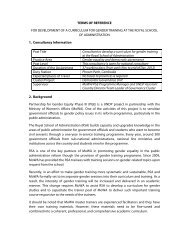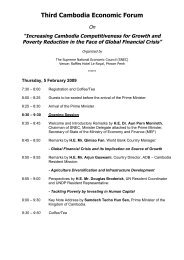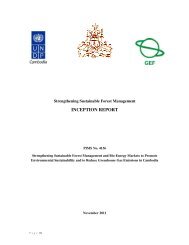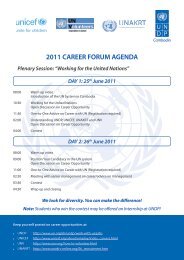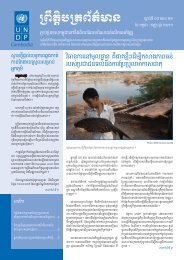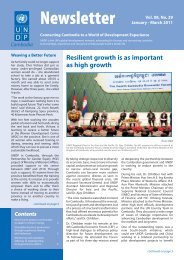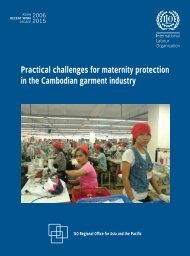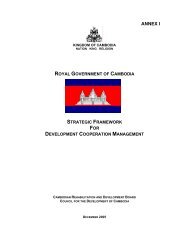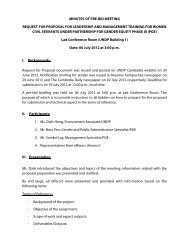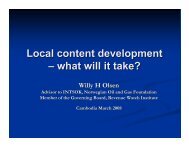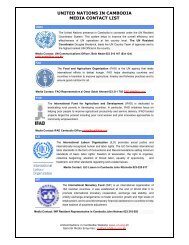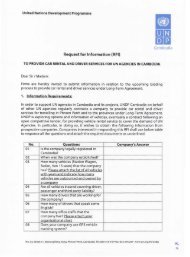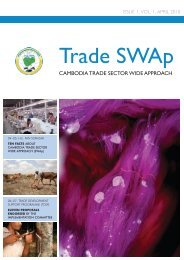UN Analysis Final.pdf - United Nations in Cambodia
UN Analysis Final.pdf - United Nations in Cambodia
UN Analysis Final.pdf - United Nations in Cambodia
Create successful ePaper yourself
Turn your PDF publications into a flip-book with our unique Google optimized e-Paper software.
For the f<strong>in</strong>al conclud<strong>in</strong>g exercise, the facilitators should ask the group participants to identify their hopes<br />
and dreams are for <strong>Cambodia</strong> <strong>in</strong> the future, perhaps 3-5 themes. They should be asked for three (3)<br />
th<strong>in</strong>gs they would like to advise today’s leaders to do <strong>in</strong> order to help those hopes/dream come true and<br />
expla<strong>in</strong> why.<br />
Key <strong>in</strong>formant and <strong>in</strong>dividual Interviews It is often best to carry out the key <strong>in</strong>formant <strong>in</strong>terviews with<br />
adults early <strong>in</strong> the fieldwork process <strong>in</strong> order to help provide background <strong>in</strong>formation as well as<br />
identify and frame trigger questions for the FGDs. Individual <strong>in</strong>terviews with youth or others can then be<br />
conducted toward the end of the fieldwork when the general issues <strong>in</strong> the village have become clearer.<br />
The <strong>in</strong>dividual <strong>in</strong>terview can then be used as an opportunity to explore specific issues <strong>in</strong> detail and clarify<br />
<strong>in</strong>formation and observations.<br />
Report<strong>in</strong>g back to the village/verification It is important to keep <strong>in</strong> m<strong>in</strong>d that we are visitors <strong>in</strong> the village<br />
and that people who participate <strong>in</strong> FGDs and agree to <strong>in</strong>terviews are <strong>in</strong> fact tak<strong>in</strong>g time away from their<br />
usual busy schedules. We need to respect this at all times. One way of show<strong>in</strong>g our respect for people’s<br />
time and effort is to report back to the village what we have observed and found and seek their<br />
verification and clarification. This meet<strong>in</strong>g should be conducted at the end of the village visit and can<br />
be organised with help from the village chief and other leaders <strong>in</strong> the village. This meet<strong>in</strong>g should be<br />
planned <strong>in</strong> the very beg<strong>in</strong>n<strong>in</strong>g and should be open to everyone from the village, especially young people. As<br />
with the FGDs, this meet<strong>in</strong>g should be recorded along with careful note-tak<strong>in</strong>g.<br />
Outputs The ma<strong>in</strong> outputs from the village fieldwork will <strong>in</strong>clude the daily reports, <strong>in</strong>dividual <strong>in</strong>terview<br />
standard forms, and the village synthesis report. Other outputs will <strong>in</strong>clude all enumerator field notes,<br />
cassette record<strong>in</strong>gs, and community timel<strong>in</strong>e exercises, as recorded on newspr<strong>in</strong>t. The team leader should<br />
be sure that all of this material is available and well organised before depart<strong>in</strong>g the village<br />
III. CHECKLIST OF ISSUES AND METHODS FOR FGDS<br />
Be prepared with all the material you need (<strong>in</strong>clud<strong>in</strong>g water and snacks to share with participants) and<br />
be ready to start on time, even though some participants may arrive after the scheduled time.<br />
Gett<strong>in</strong>g discussion underway: start the FGD by do<strong>in</strong>g a simple community timel<strong>in</strong>e exercise to help<br />
participants talk<strong>in</strong>g about their village environment<br />
Keep<strong>in</strong>g the discussion mov<strong>in</strong>g: Occasionally there may be pauses or gaps <strong>in</strong> the discussion. Be prepared<br />
to use a “trigger” question or observation and ask participants to comment.<br />
Often times, a few people may tend to dom<strong>in</strong>ate. Be <strong>in</strong>clusive! Be sure each participant gets a chance to<br />
speak, so politely ask <strong>in</strong>dividuals what their idea/op<strong>in</strong>ion is if they have not had a chance to speak.<br />
Clarify and check back with the group frequently to make sure you understand what they have said. Also,<br />
ask the group if they agree or disagree with a certa<strong>in</strong> po<strong>in</strong>t. This is also a good way to generate more<br />
discussion.<br />
Prob<strong>in</strong>g questions: the most important component of conduct<strong>in</strong>g an <strong>in</strong>formative e FGD is to keep<br />
ask<strong>in</strong>g prob<strong>in</strong>g questions. Keep <strong>in</strong> m<strong>in</strong>d that the key word <strong>in</strong> this regard is “why”? Keep prob<strong>in</strong>g for<br />
Situation <strong>Analysis</strong> of Youth <strong>in</strong> <strong>Cambodia</strong><br />
135



